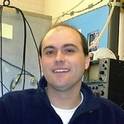| Present | Professor, Eastern Illinois University ‐ Chemistry and Biochemistry | |
|
|
||
Disciplines
Research Interests
Courses
- CHM 1310, 1410, 1510 General Chemistry I, II
- CHM 1315, 1415, 1515 General Chemistry Laboratory I, II
- CHM 3910 Physical Chemistry I (Thermodynamics)
- CHM 3915 Physical Chemistry Laboratory
- CHM 3920 Physical Chemistry II (Quantum Chemistry)
- CHM 4770 Molecular Spectroscopy
- CHM 5300 Graduate Molecular Spectroscopy
| 1995 | PhD, University of Exeter | |
|
|
||
| 1992 | BS, University of Exeter | |
|
|
||
